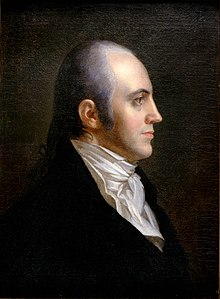Aaron Burr, Jr.
| Aaron Burr | |
|---|---|
 |
|
| 3rd Vice President of the United States | |
|
In office March 4, 1801 – March 4, 1805 |
|
| President | Thomas Jefferson |
| Preceded by | Thomas Jefferson |
| Succeeded by | George Clinton |
|
United States Senator from New York |
|
|
In office March 4, 1791 – March 4, 1797 |
|
| Preceded by | Philip Schuyler |
| Succeeded by | Philip Schuyler |
| 3rd Attorney General of New York | |
|
In office September 29, 1789 – November 8, 1791 |
|
| Governor | George Clinton |
| Preceded by | Richard Varick |
| Succeeded by | Morgan Lewis |
| Personal details | |
| Born |
February 6, 1756 Newark, New Jersey, British America |
| Died |
September 14, 1836 (aged 80) New York City, New York, U.S. |
| Resting place | Princeton Cemetery |
| Political party | Democratic-Republican |
| Spouse(s) |
Theodosia Bartow Prevost (m. 1782; her death 1794) Eliza Jumel (m. 1833; his death 1836) |
| Children | Theodosia Burr Alston |
| Parents |
Aaron Burr Sr. Esther Edwards |
| Alma mater | Princeton University |
| Signature |  |
| Military service | |
| Allegiance |
|
| Service/branch | Continental Army |
| Years of service | 1775–1779 |
| Rank | Lieutenant Colonel |
| Battles/wars | American Revolutionary War |
Aaron Burr Jr. (February 6, 1756 – September 14, 1836) was an American politician. He was the third Vice President of the United States (1801–1805), serving during President Thomas Jefferson's first term.
Burr served as a Continental Army officer in the Revolutionary War, after which he became a successful lawyer and politician. He was elected twice to the New York State Assembly (1784–1785, 1798–1799), was appointed New York state attorney general (1789–1791), was chosen as a United States senator (1791–1797) from the state of New York, and reached the apex of his career as Vice President.
The highlight of Burr's tenure as president of the Senate (one of his few official duties as Vice President) was the Senate's first impeachment trial, that of Supreme Court justice Samuel Chase. In 1804, the last full year of his single term as Vice President, Burr killed his political rival Alexander Hamilton in a famous duel. Burr was never tried for the illegal duel, and all charges against him were eventually dropped, but Hamilton's death ended Burr's political career.
After leaving Washington, Burr traveled west seeking new opportunities, both economic and political. His activities eventually led to his arrest on charges of treason in 1807. The subsequent trial resulted in acquittal, but Burr's western schemes left him with large debts and few influential friends. In a final quest for grand opportunities, he left the United States for Europe. He remained overseas until 1812, when he returned to the United States to practice law in New York City. There he spent the rest of his life in relative obscurity.
...
Wikipedia
